#as far as i'm concerned anyway
Text
when my ig captions have different languages in them they usually have different jokes in each. i want to say that it's meant as a fun little bonus for those who read the whole captions, but the reality is that i just think of different things to say and can't be bothered to translate.
#they're very often not translations of each other at all#面倒臭いかも知らないけど、翻訳するのはもっと面倒臭い#as far as i'm concerned anyway
2 notes
·
View notes
Text



Kurt Russell as R.J. MacReady
THE THING (1982) dir. John Carpenter
#the thing#the thing 1982#r j macready#kurt russell#filmedit#horroredit#scifiedit#mine#a macready gifset? on tumblr dot com? groundbreaking.#<-this is all to say that these scenes have been giffed 7397493849 times before in far more gorgeous detail#but I'm throwin these in the tag anyway. bc we should all ponder our orbs about him from time-to-time#I played around w/colors on these and I'm kinda digging the blue#obsessed w/the fact that universal was leery about hiring kurt russell for this part bc he was ''too young and pretty'' fhsdjfhdsjhfdsjhfd#incredible. valid concerns. he was indeed v young and v pretty here#to use my previous tags:#macready if you read this im free on thursday night and would like to hang out#please respond to this and then hang out with me on thursday night when I’m free#guy of all time truly
1K notes
·
View notes
Note
Lol, I was scrolling through some of your older posts and saw the one where Greygold was an NPC in the adventures of a Durge. Which made me wonder: Do you think Greygold would willingly travel with a Durge and try to help them with their urges?
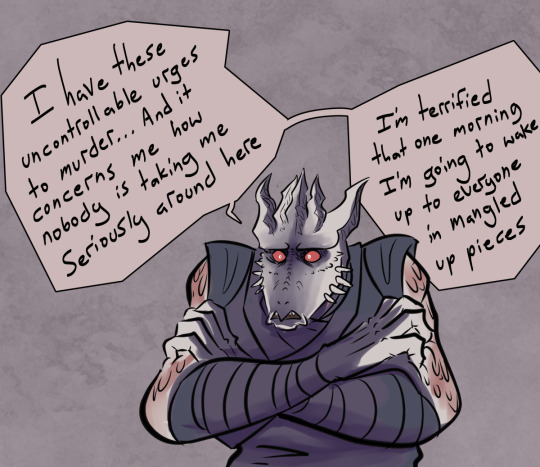
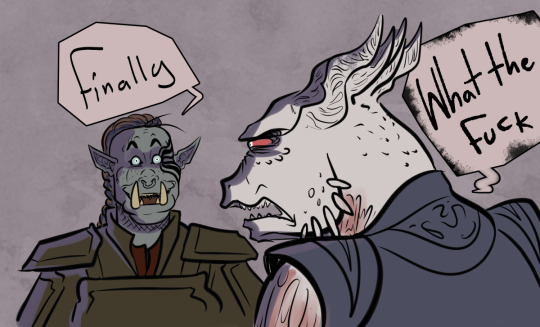

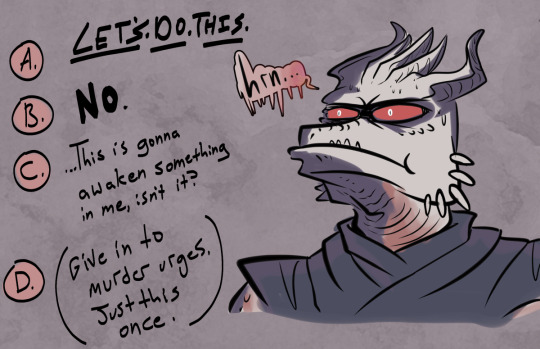
The key word is "try"
#bg3 fanart#baldur's gate 3#bg3#durge#greygold#can you tell that I'm still mad about the rope#anyway I only got as far as Gale being REALLY chill about Durge's murder urge confessions and it....-concerns me-#Greygold would try- disastrously try#Booby-trap the camp shenanigans#Durge falls into a pitfall in the middle of the night while sleep-murdering
466 notes
·
View notes
Text
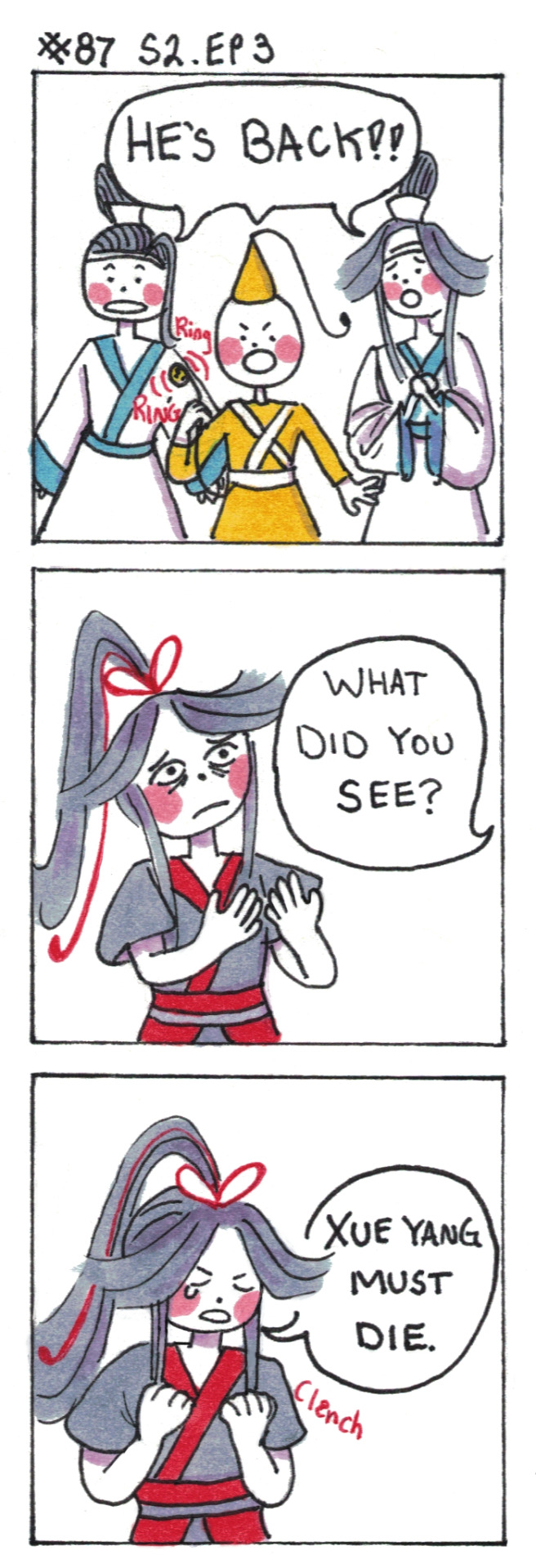
End of Empathy (time for violence)
[First] Prev <–-> Next
#poorly drawn mdzs#mdzs#wei wuxian#lan jingyi#jin ling#lan sizhui#We are back to the present! Honestly I think I'm going to try and truncate the rest of this arc.#I LOVE yi-city and I really appreciate all of the support the yi-city lovers have given me. And the patience of those who aren't.#But it's been two months. And I need to move this along </3#Anyways; I love the start of ep 3 so much. The worried concern of the juniors is so cute#but the crown jewel by far is wwx responding like a parent that's very hungover but trying so hard to be nice about it#like 'shhh shhhh guys hi I'm up now. Can you keep the volume down. Can you get me some water and my sunglasses from the glovebox.'#and of course the incredible wham line of 'Xue Yang Must Die.'#'Is YX irredeemable? I'm pro 'everyone is capable of change and deserves a chance.' So Im of the camp of 'if he had the opportunity...maybe#The issue is that this setting has no structure to provide those opportunities. You are perceived as a threat therefor you must die#XY is a very interesting parallel to the YLLZ because they both meet the same fate: outsiders determining that they need to be killed#plus both did war crimes. I know it's easy to forget the YLLZ actually did do some of the things he was accused of (most wrong)#but wwx also has blood on his hands. He also sought revenge in pretty twisted ways. Both were given opportunities to step away and refused#The difference is that we empathize with and like XXC & SL and A-Qing. The Narrative says they were wronged and that is an injustice.'
713 notes
·
View notes
Text
rumor has it that if you ask me about porus 2017 I will vibrate at the speed of light and then combust out of sheer anger
#i postponed watching the last 6 episodes because I couldn't watch Hasti die yet i love him too much#and OH MY GOODNESS I should've just left it at that#this was by far the absolute worst ending I've ever seen#character assassination at its finest#and no I'm not talking about the fact that puru was literally assassinated in the end#I'm talking about the fact that Alexander did the most absurd things including murdering puru's brother#AND disrespecting his dead body#and by the end Puru was calling him friend#CHARACTER#ASSASSINATION#this can't be the same puru that brutally murdered ambhiraj out of vengeance#Alexander was the WORST he deserved DEATH and nothing else#it wouldn't be historically accurate you say???#WHAT about this show was historically accurate my guy???#anyway It's been a week and I'm still LIVID don't touch me I will explode#to whom it may concern.#the three people in this fandom come get y'all juice#porus#indian tumblr#desi tumblr#desiblr
70 notes
·
View notes
Note
Hii!! Could u do a kawaii fashion/sanrio moodboard if u didnt do 1 yet?? :33 pref no paci ^_^
Sure!!



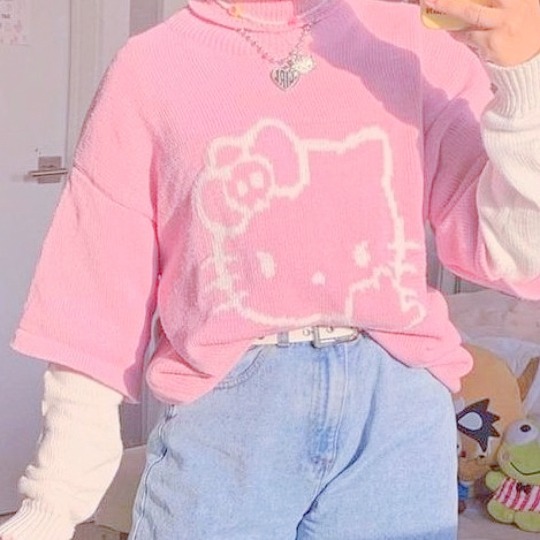
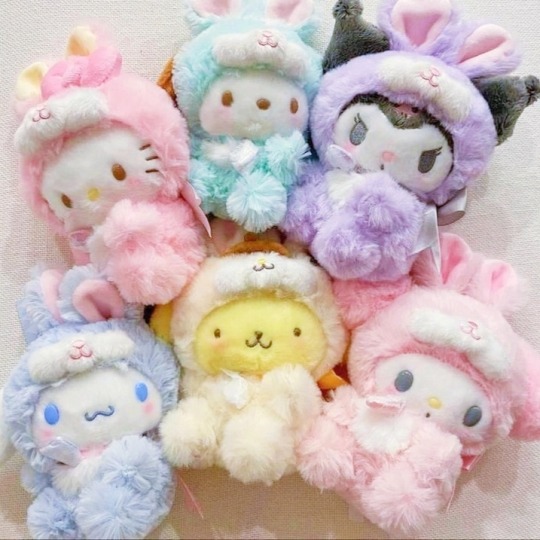





#sanrio#and#fashion#sanrio fashion#!!!!#i figured I'd just fuse them since i only get 9 pictures#i hope thats okay#i had a lot of fun with this one#the only issue is that I didn't know if the clothes were supposed to be masc or fem#so this one is gender neutral as far as I'm concerned#anyway i hope you enjoy#sfw interaction only#moodboard#sfw agere#agere#age regression#sfw littlespace#agere moodboard#age dreaming
104 notes
·
View notes
Text
Woe! Cringe be upon ye
Watch me slowly get the hang of motion tracking lmao
#there is a list on my phone of SO many more of these but it was getting too long so.#might post a part 2 eventually who knows#as far as i'm concerned ''lemme see what you have'' is canon#so is ''what the fuck richard'' and ''is scott here''#the vampire dies in no time#kyuuketsuki sugu shinu#I SHOULD'VE PUT JOHN INTO THE MISS KEISHA VINE BUT I JUST CANCELED THE SUBSCRIPTION ON MY EDITING SOFTWARE LOL#anyway i've been editing these so long i can't tell if they're funny anymore lol please let me know
91 notes
·
View notes
Text
//Spoilers for Everything in AC6: Fires of Rubicon//
The Meaning of the Motif of "Borrowed Wings" and how G5 Iguazu Exists to Reinforce It
What seems to fly over everyone's heads about G5 Iguazu is that the point of his character is how 'deciding upon a goal and having the willpower to strive for it, no matter what' is literally as important as the line between life and death.
You need to find a purpose for yourself that you personally believe in. Cause no matter how grand or how petty that purpose is, if you don't have one... you die!
With whether or not you actually succeed at that goal being completely irrelevant... to your conviction for it.
(Something, something, it's the ambition that you're living for, not whether or not you get the accolades at the end.)
A moral proclaiming the importance of "deciding upon a purpose of your own free will, and then pursuing that goal no matter what setbacks you encounter" is all nice and easy when you're main character e621, who experiences no setbacks because, as the player, you're necessarily going to be strongest fighter in the galaxy.
But it's pretty obvious how trite that is on its own, where your only canonical character trait is that you always win no matter what.
And so, Iguazu's purpose narratively is to show how, beyond any ounce of doubt whatsoever, that 'winning' is not a relevant part in what makes "having a purpose" so important, or so necessary.
In essence: It's what makes Iguazu live.
Start of the Game: Volta and Iguazu both want to beat up Michigan.
- Volta gives up, and then he gets sent by Michigan to die at the Wall.
- Iguazu deserts. And he does not die at the Wall.
After Gallia Dam he send you hatemail to say that the Redguns will scale the wall, but Iguazu himself doesn't even approach the Wall after this. As G4 Volta's last words reveal, he deserts before the operation is attempted.
Iguazu *himself* watches from the sidelines, costing him no less than an almost certain death like Volta's.
And the reason Iguazu changes his mind about scaling the wall with the Redguns is because, after Gallia Dam, Iguazu decides upon his purpose. His personal conviction.
Iguazu personal goal becomes -> He wants to kill you.
We love pathetic boys.
But the reason Iguazu deserts for the sake of this new goal is specifically because he wants to become stronger than 621, and not want his obligations as part of the Redguns to get in the way of this goal of his, he goes independent.
--- Correction ---
Iguazu deserts the Redguns at Watchpoint Alpha, prior to the death of G1 Michigan. He doesn't desert the Redguns at the Wall, he only goes Away WithOut Leave. The reason for which he goes AWOL being to take independent work, as we see an example of at Grid 086. Outcomes of everything are still the same, I just mixed up the order.
Also;

Volta: "Iguazu, listen, like, Michigan really like cares about us...! It's like we're part of his family, man, just give him a chance."
Volta: *Gives Michigan a chance*
Volta: *Gets killed under the leadership of G1 Michigan*
It's really funny but sad.
It's also really funny and sad how effective at Yank-bait G1 Michigan was.
But it's illustrative of how effective it is to break down someone's expectations and feelings of self-worth to legit 0, such that empty platitudes like simply saying the right words, like the names of the expendables themselves or to bring in the medical teams after a battle (as if they wouldn't have come otherwise?), will leave such an impression that they think you really do care about them--even in despite of how worthless they obviously are~!
And all at the same time as your direct actions and orders lead them straight to their meaningless avoidable deaths.
What could be more cost-efficient for your employers than soldiers who're literally suicidal for you, right?
Ha!
--- ---
And not only does this decision directly lead to Iguazu not dying at the Wall, but, no longer squeezed under G1 Michigan's boots, G5 even directly improves as a fighter.
This is shown in how his AI differs between his fighting at the Gallia Dam--where he's overly defensive, constantly having his shield up, despite wielding two guns.
And then, later at the Grid--where he actually fights aggressively like his AC's loadout is built for.
The second major encounter with Iguazu is Watchpoint Alpha where he either fights you directly, and dies there. Or he hires Coldcall to kill you, and survives elsewhere. Again, this is an instance of Iguazu's legitimate determination towards his chosen goal directly separating him from life and death.
When he hires Coldcall, Iguazu focuses on his goal, and let's go of distractions like his personal pride and image.
Ridiculous, right? Iguazu letting go of his pride?
But consider how it's directly Iguazu's personal feelings that lead him to facing 621 personally. He doesn't *just* want to kill you in that instant, he wants the glory of killing you as well.
But the accolades at the end aren't what makes it worthy to pursue a chosen goal.
Iguazu wants 621 dead. And when he hires Coldcall, this is him coming to terms with pursuing his goal, regardless of his personal setbacks. Iguazu faces the fact that he personally wouldn't be able to kill you. And, because he comes to term with this setback, he finds an alternative method that would still lead towards fulfilling his chosen purpose.
To confirm, of course, Iguazu's purpose is really dumb and terrible. But it's not whether one's chosen purpose is 'a good goal' or not that the value of pursuing it comes from. The value comes from it being one you decided for yourself, as opposed to, for, for example, by a corporation's profits. (Not a coincidence narratively how Balam's forces, united most in their complete idolization of G1 Michigan, following *his* word no matter what even knowingly to their deaths, are the deadmost losers in the story.)
Unlike for example e621's chosen conviction, or Rusty's chosen conviction, (Also no coincidence narratively that G1 Michigan, who only exists as the weapon of his corporation and put out a bounty for his own assassination--expressing how he has no personal plans for the future and literally wants to die--is guaranteed to be taken out by either of these two, no matter what.)
It's not the loftiness of a goal that determines if it's of worth to decide upon one of your own free will and pursue it in the first place.
The 'value' of pursuing a goal is unrelated to what that goal itself is.
What makes pursuing a goal valuable, is the conviction.
You don't have to be smart. You don't have to be emotionally mature. You don't have to be a good fighter. You don't even have to be brave.
You just need to choose your purpose and follow it.
This is what the motif of 'wings' and 'borrowed wings' are all about in the story as well. It's about pursuing a goal that was chosen by someone else, versus pursuing a goal that was chosen by you yourself.
"They choose what to fight for, and take to the skies in flight."
"One cannot fly on borrowed wings" in this case literally meaning that if you pursue a goal not because you want it, but because someone else wants it, it will directly lead to your death.
Criticizing their "borrowed wings" is what Ayre and Rusty chastise the RLF for for solely repeating slogans and "not bothering to think [for themselves]."
And Iguazu, deciding he doesn't care about how he'd be seen by others, and only caring for the goal itself to be accomplished. Survives, where Coldcall dies in his place.
Coldcall, a far superior fighter to Iguazu. Dies, instead of Iguazu, because he was flying for Iguazu's purpose -> Fighting on borrowed wings.
Etc etc "this is hell, we're in hell!" and so on and in the Alea Iacta Est true ending of the game Iguazu, outta nowhere!, becomes the legit Final Boss of Armored Core 6.
How the hell did this 4th-gen AC pilot, otherwise a completely random nobody without a purpose not given to him by his employer, get to outer space and stuff, right?
Well, consider how the complete rando that was e621 does the same: Their personal conviction.
"But Iguazu only got to become the final boss out of dumb luck," right? ALLMIND chose him for little else but that he was the only old-gen Augmented Human that was still alive. If ALLMIND wasn't there, he couldn't have accomplished anything, so obviously it can't actually be meaningful.
But how would 621 have escaped Institute City without being rescued by Carla? How would we have escaped Arquebus re-education without the AC that Handler Walter secretly assembled left for us?
And, most relevantly here since this is the Alea Iacta Est route itself: How would 621 have known about V.II Snail planning to ambush you in Institute City without ALLMIND herself's very assistance?
C4-621 is, at a glance, just as much a recipient of dumb luck as Iguazu.
But thematically, it's not pure happenchance.
It's the results of the both of these characters continuing to fight for a cause they chose to believe in, no matter what.
So Iguazu survives. He survives the hijacking of Watchpoint Alpha by ALLMIND. And he even goes so far as to survive the hijacking of his own brain by ALLMIND, taking over the final boss even after being assimilated.

"What essential difference made ACs superior to unpiloted craft?"
The answer is simple -> One cannot fly on borrowed wings.
Unpiloted craft can never have a purpose that is actually their own. They exist only for the person who's wings they borrow--who's purpose they serve--who built them.
That's why piloted ACs are better. *Not* on borrowed wings, in this case, they can fly higher.
For C4-621, that chosen goal is to achieve Coral Release. (Since it's is still the mission you yourself choose that finally puts you on the Alea Iacta Est route or not, it fits within the theme of free will. Even though, as a videogame, there's an obvious limit to just *how* much free will the player is actually able to express. Within the story, however, when 621 chooses the mission to begin the path to an ending, that's them deciding for themselves 100% that's that the goal they want to achieve, no matter what.)
For Iguazu, that chosen goal is to kill you. (The goal he wants to achieve, no matter what.)
And so, because he was not flying on borrowed wings. Iguazu survives fucking everything. Stupid wings, yeah. But that just shows: What matters is only that they were his own.
Even against the most powerful super duper AI mastermind that ALLMIND was, the biggest loser on Earth, G5 Iguazu, survived.
Where even she is made to give way to Iguazu's conviction -> Killing e621.
Hammering this point home is why "I'm only here for what *I* want! I don't care about ALLMIND's goals, just my own!" is basically the only thing Iguazu says across like 2 entire 3rds of the final boss.
Iguazu's chosen goal is not ultimately successful.
But it wasn't whether or not Iguazu ultimately killed 621 in Rubicon's exosphere that lead to him not dying at the Wall like G4 Volta, or at Watchpoint Alpha like G1 Michigan and Coldcall, or upon the destruction of his physical body by ALLMIND.
It was his conviction that lead him past those things. His WINGS!
He chose what to fight for, and he fought for it.
On the wings of his free will, Iguazu flew above even the very clouds of Rubicon itself.
And that's why he was the Final Boss.
The only thing able to finally kill him being the person with a conviction even greater, C4-621.
(As a sidenote; Taking account of the main moral of Armored Core 6 really puts into perspective how many trillions of times it gets repeated explicitly across the game lol.
VS Rusty, VS Rusty when he calls you "power without a purpose," VS Cinder Carla, VS Handler Walter, Ayre's description of what the name "Raven" is literally supposed to mean, etc.
They all talk about how you've chosen your path and you'd made sacrifices to get this far and you finally have a conviction that is your own and how big a deal that is and so on.)
#tlgtw ooc#g5 iguazu#my boyfriend who hates me g5 iguazu#armored core 6#armored core 6 spoilers#alea iacta est#armored core lore#g1 michigan#it is way late at night and I am stressed out about computer problems and the only way for me to feel better#is to get as many thoughts out of my brain as possible. I'm not even really sure if this is coherent or not#but that's okay#as far as I'm concerned anyway e621's conviction is just seeing G5 Iguazu again gehehehehhehehe
129 notes
·
View notes
Text
Not sure what it says about me that I am more alarmed people don't know how to download files from Google Docs than I am about Google's policies.
#fuckery#i keep hearing about how younger generations don't understand how to use computers#but seeing examples of it on my dash wooooo boy#granted#google drive's structure is a perfect example of why it happens#and why i hate using it#the sharing features being so convenient are about the only things it has going for it as far as i'm concerned#organizing files is cumbersome and unintuitive#finding things is atrociously and needlessly difficult#THIS IS WHY IT'S IMPORTANT TO UNDERSTAND FILE STRUCTURE AND ORGANIZATION#word has plenty of flaws don't get me wrong#but i know where my shit is#and moving it around is really simple#i think i'm losin the thread here#ANYWAY
22 notes
·
View notes
Text
Am I the only one fast-forwarding through all the cop parts of the show unless it's just Phaya and Tharn alone?
#the copaganda is painful I just can't do it#I care about the beautiful romance and the fantasy elements#the cop parts can rot as far as I'm concerned#can Phaya and Tharn just like#open a bakery together or something?#it'd save Tharn the trouble of rescuing Phaya from death every other day#anyways#the sign meta#my meta#the sign#the sign the series#phayatharn
31 notes
·
View notes
Text
cannot even begin to imagine the amount of horrendous takes there would've been if yashiro was canonically a bisexual* trans woman
#*as far as i'm concerned bisexuality is already canon but i'm painfully aware that it's a somewhat controversial take#which is like. okay. do you want him to have sex with a woman on screen (again) or to say he's not gay (again) or what#idk at a certain point internalized homophobia starts feeling more like an excuse not to look at other interpretations#but also i'm bi so i'm biased (haha bi-ased get it) so what the fuck do i know right? right. anyways#the nice cis gay m/m narrative must be upheld at all costs#benvey tag
18 notes
·
View notes
Text
Clad in Justice and Worth
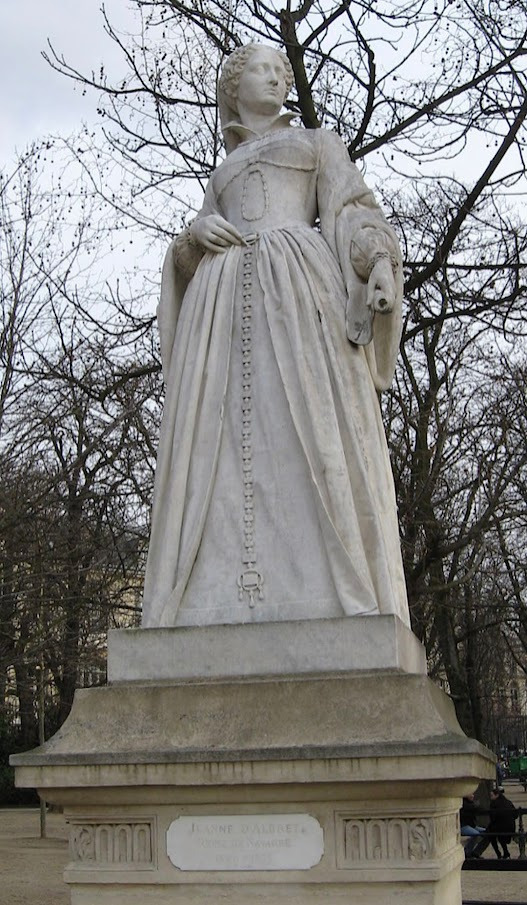
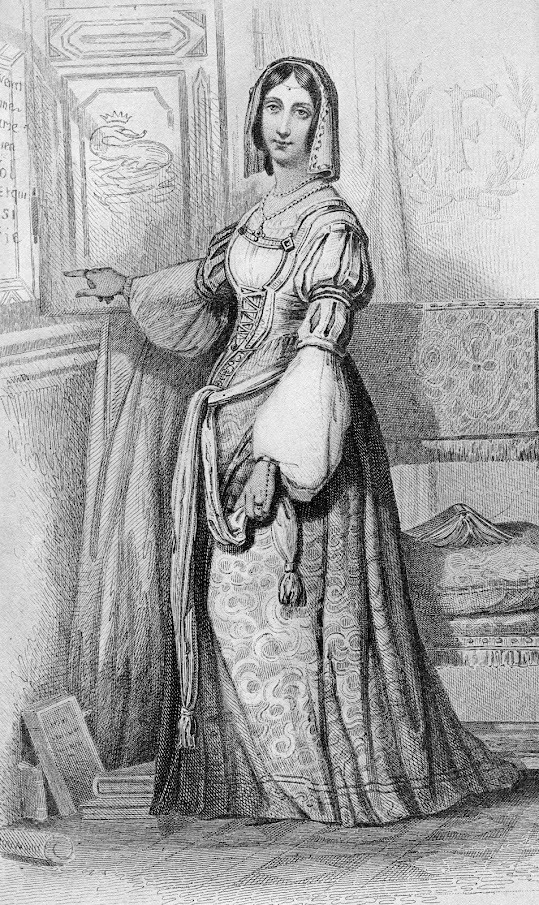
Written for the Inklings Challenge 2023 (@inklings-challenge). Inspired by the lives of Jeanne d'Albret and Marguerite de Navarre, although numerous liberties have been taken with the history in the name of introducing fantastical elements and telling a good story. The anglicization of names (Jeanne to Joan and Marguerite to Margaret) is meant to reflect the fictionalization of these figures.
The heat was unbearable, and it would grow only hotter as they descended into the lowlands. It was fortunate, Joan decided, that Navarre was a mountain country. It was temperate, even cold there in September. It would be sweltering by the sea.
The greater issue ought to have been the presence of Monluc, who would cut Joan’s party off at the Garonne River most like. The soldiers with whom she traveled were fierce, but Monluc had an entire division at the Garrone. Joan would be a prisoner of war if Providence did not see her through. Henry, perhaps, might suffer worse. He might be married to a Catholic princess.
Yet Joan was accustomed to peril. She had cut her teeth on it. Her first act as queen, some twenty years ago, had been to orchestrate the defense of her kingdom, and she was accustomed to slipping through nets and past assassins. The same could not be said of the infernal heat, which assaulted her without respite. Joan wore sensible travel clothing, but the layers of her skirts were always heavy with sweat. A perpetual tightness sat in her chest, the remnant of an old bout with consumption, and however much she coughed it would not leave.
All the same, it would not do to seem less than strong, so she hid the coughing whenever she could. The hovering of her aides was an irritant and she often wished she could just dismiss them all.
“How fare you in the heat, Majesty?”
“I have war in my gut, Clemont,” Joan snapped. “Worry not for me. If you must pester someone, pester Henry.”
He nodded, chastened. “A messenger is here from Navarre. Sent, I suspect, to induce you to return hence.”
“I would not listen to his birdcalls.”
“Young Henry said much the same.”
Joan stuffed down her irritation that Clemont had gone to Henry before he’d come to her. She was still queen, even if her son was rapidly nearing his majority. “Tell him that if the Huguenot leaders are to be plucked, I think it better that we all go together. Tell him that I would rather my son and I stand with our brothers than await soldiers and assassins in our little kingdom.”
Her aide gave a stiff nod. “At once, your Majesty.”
She would breathe easier when they reached the host at La Rochelle. Yet then, there would be more and greater work to do. There would be war, and Joan would be at the head of it.
*
When she awoke in the night, Joan knew at once that something was awry. It was cool. Gone was the blistering heat that had plagued them all day. Perhaps one of the kidnapping plots had finally succeeded.
Certainly, it seemed that way. She was in a cell, cool and dank and no more than six paces square. And yet—how strange! —the door was open.
Rising unsteadily to her feet, Joan crept towards the shaft of moonlight that fell through it. She glanced about for guards, but saw only a single prisoner in dirty clothes standing just beyond the threshold. He was blinking rapidly, as though the very existence of light bewildered him. Then, as Joan watched, he crept forward towards the gate of the jailhouse and out into the free air beyond. Joan listened for a long moment, trying to hear if there was any commotion at the prisoner’s emergence. When she could perceive none, she followed him out into the cool night air.
A lantern blazed. “Come quickly,” a voice hissed. “Our friend the Princess is waiting.”
The prisoner answered in a voice too quiet for Joan to hear. Then, quite suddenly, she heard his companion say, “Who is it that there behind you?”
The prisoner turned round, and Joan’s fingers itched towards her hidden knife. But much to her astonishment, he exclaimed, “Why, it is the lady herself! Margaret!”
But Joan had no opportunity to reply. Voices sounded outside her pavilion and she awoke to the oppressive heat of the day before. Coughing hard, Joan rolled ungracefully from her bed and tried to put away the grasping tendrils of her dream.
“The river is dry, Majesty” her attendant informed her as soon as she emerged from her pavilion, arrayed once again in sensible riding clothes. “The heat has devoured it. We can bypass Monluc without trouble, I deem.”
“Well then,” Joan replied, stifling another cough. “Glory to God for the heat.”
*
They did indeed pass Monluc the next day, within three fingers of his nose. Joan celebrated with Henry and the rest, yet all the while her mind was half taken up with her dream from the night before. Never, in all her life, had her mind conjured so vivid a sensory illusion. It had really felt cool in that jail cell, and the moonlight beyond it had been silver and true. Stranger still, the prisoner and his accomplice had called Joan by her mother’s name.
Joan had known her mother only a little. At the age of five, she had been detained at the French court while her mother returned to Navarre. This was largely on account of her mother’s religious convictions. Margaret of Angoulême had meddled too closely with Protestantism, so her brother the king had seen fit to deprive her of her daughter and raise her a Catholic princess.
His successor had likewise stolen Henry from Joan, for despite the king’s best efforts she was as Protestant as her mother. Yet unlike Margaret, Joan had gone back for her child. Two years ago, she had secretly swept Henry away from Paris on horseback. She’d galloped the horses nearly to death, but she’d gotten him to the armed force waiting at the border, and then at last home to Navarre. Sometimes, Joan wondered why her own mother had not gone to such lengths to rescue her. But Margaret’s best weapons had been tears, it was said, and tears could not do the work of sharp swords.
The Navarre party arrived at La Rochelle just before dusk on the twenty-eighth of September. The heat had faltered a little, to everyone’s great relief, but the air by the sea was still heavy with moisture. The tightness in Joan’s chest persisted.
“There will be much celebration now that you have come, Your Majesty,” said the boy seeing to her accommodations. “There’s talk of giving you the key to the city, and more besides.”
Sure enough, Joan was greeted with applause when she entered the Huguenot council. “I and my son are here to promote the success of our great cause or to share in its disaster,” she said when the council quieted. “I have been reproached for leaving my lands open to invasion by Spain, but I put my confidence in God who will not suffer a hair of our heads to perish. How could I stay while my fellow believers were being massacred? To let a man drown is to commit murder.”
*
Sometimes it seemed that the men only played at war. The Duke of Conde, who led the Huguenot forces, treated it as a game of chivalry between gentlemen. Others, like Monluc, regarded it as a business; the mercenaries he hired robbed and raped and brutalized, and though be bemoaned the cruelty he did nothing to curtail it.
There were sixty-thousand refugees pouring into the city. Joan was not playing at war. When she rose in the mornings, she put poultices on her chest, then went to her office after breaking her fast. There was much to do. She administered the city, attended councils of war, and advised the synod. In addition, she was still queen of Navarre, and was required to govern her own kingdom from afar.
In the afternoons, she often met with Beza to discuss matters of the church, or else with Conde, to discuss military matters. Joan worked on the city’s fortifications, and in the evenings she would ride out to observe them. Henry often joined her on these rides; he was learning the art of war, and he seemed to have a knack for it.
“A knack is not sufficient,” Joan told him. “Anyone can learn to fortify a port. I have learned, and I am a woman.”
“I know it is not sufficient,” the boy replied. “I must commit myself entirely to the cause of our people, and of Our Lord. Is that not what you were going to tell me?”
“Ah, Henry, you know me too well. I am glad of it. I am glad to see you bear with strength the great and terrible charge which sits upon your shoulders.”
“How can I help being strong? I have you for a mother.”
At night, Joan fell into bed too exhausted for dreams.
*
Yet one night, she woke once again to find her chest loose and her breathing comfortable. She stood in a hallway which she recognized at once. She was at the Château de Fontainebleau, the place of her birth, just beyond the door to the king’s private chambers.
“Oh please, Francis, please. You cannot really mean to send him to the stake!” The voice on the other side of the door was female, and it did not belong to the queen.
A heavy sigh answered it. “I mean to do just that, ma mignonne. He is a damned heretic, and a rabble-rouser besides. Now, sister, don’t cry. If there’s one thing I cannot bear, it is your weeping.”
At those words, a surge of giddiness, like lightning, came over Joan’s whole body. It was her own mother speaking to the king. She was but a few steps away and they were separated only by a single wooden door.
“He is my friend, Francis. Do you say I should not weep for my friends?”
A loud harumph. “A strange thing, Margaret. Your own companions told me that you have never met the man.”
“Does such a triviality preclude friendship? He is my brother in Our Lord.”
“And I am your true brother, and your king besides.”
“And as you are my brother—” here, Margaret’s voice cracked with overburdening emotion. She was crying again, Joan was certain. “As you are my brother, you must grant me this boon. Do not harm those I love, Francis.”
The king did not respond, so Joan drew nearer to the door. A minute later, she leapt backwards when it opened. There stood her mother, not old and sick as Joan had last seen her twenty years before, but younger even than Joan herself.
“If you’ve time to stand about listening at doors, then you are not otherwise employed,” Margaret said, wiping her tears from her face with the back of her hand. “I am going to visit a friend. You shall accompany me.”
Looking down at herself, Joan realized that her mother must have mistaken her for one of Fountainbleu’s many ladies-in-waiting. She was in her night clothes, which was really a simple day dress such as a woman might wear to a provincial market. Joan did not sleep in anything which would hinder her from acting immediately, should the city be attacked in the middle of the night.
“As you wish, Majesty,” Joan replied with a curtsey. Margaret raised an eyebrow, and instantly Joan corrected herself: “Your Highness.”
Margaret stopped at her own rooms to wrap herself in a plain, hooded cloak. “What is your name?” she asked.
“Joan, your Highness.”
“Well, Joan. As penance for eavesdropping, you shall keep your own counsel with regards to our errand. Is that clear?”
“Yes, your Highness,” Joan replied stiffly. Any fool could see what friend Margaret intended to visit, and Joan wished she could think of a way to cut through the pretense.
When Margaret arrived at the jail with Joan in tow, the warden greeted her almost like a friend. “You are here to see the heretic, Princess? Shall I fetch you a chair?”
“Yes, Phillip. And a lantern, if you would.”
The cell was nearly identical to the one which Joan had dreamed on the road to La Rochelle. Inside sat a man with sparse gray hair covering his chin. Margaret’s chair was placed just outside the cell, but she brushed past it. She handed the lantern to Joan and knelt down in the cell beside the prisoner.
“I was told that I had a secret friend in the court,” he said. “I see now that she is an angel.”
“No angel, monsieur Faber. I am Margaret, and this is my lady, Joan. I have come to see to your welfare, as best I am able.”
Now, Margaret’s hood fell back, and all at once she looked every inch the Princess of France. Yet her voice was small and choked when she said, “Will you do me the honor of praying with me?”
Margaret was already on her knees, but she lowered herself further. She rested one hand lightly on Faber’s knee, and after a moment, he took it. Her eyes fluttered closed. In the dim light, Joan thought she saw tears starting down her mother’s cheek.
When she woke in the morning, Joan could still remember her mother’s face. There were tears in her hazelnut eyes, and a weeping quiver in her voice.
*
Winter came, and Joan’s coughing grew worse. There was blood in it now, and occasionally bits of feathery flesh that got caught in her throat and made her gag. She hid it in her handkerchief.
“Winter battles are ugly,” Conde remarked one morning as Christmas was drawing near. “If the enemy is anything like gentlemen, they will not attack until spring. And yet, I think, we must stand at readiness.”
“By all means,” Joan replied. “Anything less than readiness would be negligence.”
Conde chuckled, not unkindly. “For all your strength and skill, madame, it is obvious that you were not bred for command. No force can be always at readiness. It would kill the men as surely as the sword. ‘Tis not negligence to celebrate the birth of Our Lord, for instance.”
Joan nodded curtly, but did not reply.
As the new year began, the city was increasingly on edge. There was frequent unrest among the refugees, and the soldiers Joan met when she rode the fortifications nearly always remarked that an attack would come soon.
Then, as February melted into March, word came from Admiral Coligny that his position along the Guirlande Stream had been compromised. The Catholic vanguard was swift approaching, and more Huguenot forces were needed. By the time word reached Joan in the form of a breathless young page outside her office, Conde was already assembling the cavalry. Joan made for the Navarre quarter at once, as fast as her lungs and her skirts would let her.
The battle was an unmitigated disaster. The Huguenots arrived late, and in insufficient numbers. Their horses were scattered and their infantry routed, and the bulk of their force was forced back to Cognac to regroup. As wounded came pouring in, Joan went to the surgical tents to make herself useful.
The commander La Noue’s left arm had been shattered and required amputation. Steeling herself, Joan thought of Margaret’s tearstained cheeks as she knelt beside Faber. “Commander La Noue,” she murmured, “Would it comfort you if I held your other hand?”
“That it would, Your Majesty,” the commander replied. So, as the surgeon brandished his saw, Joan gripped the commander’s hand tight and began to pray. She let go only once, to cover her mouth as she hacked blood into her palm. It blended in easily with the carnage of the field hospital.
Yet it was not till after the battle was over that Joan learned the worst of it. “His Grace, General Conde is dead,” her captain told her in her tent that evening. “He was unseated in the battle. They took him captive, and then they shot him. Unarmed and under guard! Why, as I speak these words, they are parading his corpse through the streets of Jarnac.”
“So much for chivalry,” murmured Joan, trying to ignore the memories of Conde’s pleasant face chuckling, calling her skilled and strong.
“We will need to find another Prince of the Blood to champion our cause,” her captain continued. “Else the army will crumble. If there’s to be any hope for Protestantism in France, we had better produce one with haste. Admiral Coligny will not serve. He’s tried to rally the men, to no avail. In fact, he has bid me request that you make an attempt on the morn.”
“Henry will lead.”
“Henry? Why, he’s only a boy!”
Joan shook her head. “He is nearly a man, Captain, and he’s a keen knack for military matters. He trained with Conde himself, and he saw to the fortification of La Rochelle at my side. He is strong, which matters most of all. If it’s a Prince of the Blood the army requires, Henry will serve.”
“As you say, Majesty,” said her captain with a bow. “But it’s not me you will have to convince.”
*
Joan settled in for a sleepless night. Her captain was correct that she would need to persuade the Huguenot forces well, if they were to swear themselves to Henry. So, she would speak. Joan would rally their courage, and then she would present them with her son and see if they would follow him.
Page after page she wrote, none of it any good. Eloquence alone would not suffice; Joan’s words had to burn in men’s chests. She needed such words as she had never spoken before, and she needed them by morning.
By three o’clock, Joan’s pages were painted with blood. Her lungs were tearing themselves to shreds in her chest, and the proof was there on the paper beside all her insufficient words. She almost hated herself then. Now, when circumstance required of her greater strength than ever before, all Joan’s frame was weakness and frailty.
An hour later, she fell asleep.
When Joan’s eyes fluttered open, she knew at once where she was. Why, these were her own rooms at home in Navarre! Sunlight flooded through her own open windows and drew ladders of light across Joan’s very own floor. Her bed sat in the corner, curtains open. Her dressing room and closet were just there, and her own writing desk—
There was a figure at Joan’s writing desk. Margaret. She looked up.
“My Joan,” she said. It started as a sigh, but it turned into a sob by the end. “My very own Joan, all grown up. How tired you look.”
The words seemed larger than themselves somehow. They were Truth and Beauty in capital letters, illuminated red and gold. Something in Joan’s chest seized; something other than her lungs.
“How do you know me, mother?”
“How could I not? I have been parted from you of late, yet your face is more precious to me than all the kingdoms of the earth.”
“Oh.” And then, because she could not think of anything else to say, Joan asked, “What were you writing, before I came in?”’
“Poetry.” Joan made a noise in her throat. “You disapprove?” asked her mother.
“No, not at all. Would that I had time for such sweet pursuits. I have worn myself out this night writing a war speech. It cannot be poetry, mother. It must be wine. It must–” then, without preamble, Joan collapsed into a fit of coughing. At once, her mother was on her feet, handkerchief in hand. She pressed it to Joan’s mouth, all the while rubbing circles on her back as she coughed and gagged. When the handkerchief came away at last, it was stained red.
“What a courageous woman you are,” Margaret whispered into her hair. “Words like wine for the soldiers, and yourself spitting blood. Will you wear pearls or armor when you address them?”
“I will address them on horseback in the field,” answered Joan with a rasp. “I would have them see my strength.”
Her mother’s dark eyes flickered then. Margaret looked at her daughter, come miraculously home to her against the will of the king and the very flow of time itself. She was not a large woman, but she held herself well. She stood brave and tall, though no one had asked it of her.
Her own dear daughter did not have time for poetry. Margaret regretted that small fact so much that it came welling up in her eyes. “And what of your weakness, child? Will you let anyone see that?”
Joan reached out and caught her mother’s tears. Her fingertips were harder than Margaret’s were. They scratched across the sensitive skin below her eyes.
“Did I not meet you like this once before? You are the same Joan who came with me to the jail in Paris once. I did not know you then. I had not yet borne you.”
“Yes, the very same. We visited a Monsieur Faber, I believe. What became of that poor man?”
Margaret sighed. She crossed back over to the desk to fall back into her seat, and in a smaller voice she said, “My brother released him, for a time. And then, when I was next absent from Paris, he was arrested again and sent to the stake before I could return.”
“I saw you save another man, once. I do not know his name. How many prisoners did you save, mother?”
“Many. Not near enough. Not as many as those with whom I wept by lantern light.”
“Did the weeping do any good, I wonder.”
“Those who lived were saved by weeping. Those who died may have been comforted by it. It was the only thing I could give them, and so I must believe that Our Lord made good use of it.”
Joan shook her head. She almost wanted to cry too, then. The feeling surprised her. Joan detested crying.
“All those men freed from prison, yet you never came for me. Why?”
“Francis was determined. A choice between following Christ and keeping you near was no choice at all, though it broke my heart to make it.”
If Joan shut her eyes, she could still remember the terror of the night she had rescued Henry. “You could have come with soldiers. You could have stolen me away in the night.”
Margaret did not answer. The tears came faster now and her fair, queenly skin blossomed red. So many years would pass between the dear little girl she’d left in Paris and the stalwart woman now before her. She did not have time for poetry, but if Margaret had been allowed to keep her that would have been different. Joan should have had every poem under the sun.
“Will you read it?” she asked, taking the parchment from her desk and pressing it into her daughter’s hands. “Will you grant me that boon?”
Slowly, almost numbly, Joan nodded. To Margaret’s surprise, she read aloud.
“God has predestined His own
That they should be sons and heirs.
Drawn by gentle constraint
A zeal consuming is theirs.
They shall inherit the earth
Clad in justice and worth.”
“Clad in justice and worth,” she repeated, handing back the parchment. “It’s a good poem.”
“It isn’t finished,” replied her mother.
Joan laughed. “Neither is my speech. It must be almost morning now.”
As loving arms closed around her again, Joan wished to God that she could remain in Navarre with her mother. She knew that she and Margaret did not share a heart: her mother was tender like Joan could never be. Yet all the same, she wanted to believe that they had been forged by the same Christian hope and conviction. She wanted to believe that she, Joan, could free the prisoners too.
She shut her eyes against her mother’s shoulder. When she opened them, she was back in her tent, with morning sun streaming in.
*
She came before the army mounted on a horse with Henry beside her. Her words were like wine when she spoke.
“When I, the queen, hope still, is it for you to fear? Because Conde is dead, is all therefore lost? Does our cause cease to be just and holy? No; God, who has already rescued you from perils innumerable, has raised up brothers-in-arms to succeed Conde.
Soldiers, I offer you everything in my power to bestow–my dominions, my treasures, my life, and that which is dearer to me than all, my son. I make here a solemn oath before you all, and you know me too well to doubt my word: I swear to defend to my last sigh the holy cause which now unites us, which is that of honor and truth.”
When she finished speaking, Joan coughed red into her hands. There was quiet for a long moment, and then a loud hurrah! went up along the lines. Joan looked out at the soldiers, and from the front she saw her mother standing there, with tears in her eyes.
#inklingschallenge#inklings challenge#team tolkien#genre: time travel#theme: visiting the imprisoned#with a tiny little hint of#theme: visiting the sick#story: complete#so i like to read about the reformation in october when i can#when the teams were announced i was burning through a book on the women of the reformation and these two really reached out and grabbed me#Jeanne in particular. i was like 'it is so insane that this person is not more widely known.'#Protestantism has its very own badass Jeanne/Joan. as far as i'm concerned she should be as famous as Joan of Arc#so that was the basis for this story#somewhere along the line it evolved into a study on different kinds of feminine power#and also illness worked itself in there. go me#anyway. hopefully my catholic friends will give me a shot here in spite of the protestantism inherant in the premise#i didn't necessarily mean to go with something this strongly protestant as a result of the Catholic works of mercy themes#but i'm rather tickled that it worked out that way#on the other hand i know that i have people following me that know way more about the French Wars of Religion and the Huguenots than i do#hopefully there's enough verisimilitude here that it won't irritate you when i inevitably get things wrong#i think that covers all my bases#i am still not 100% content with how this turned out but i am at least happy enough to post it#and get in right under the wire. it's a couple hours before midnight still in my time zone#pontifications and creations#leah stories#i enjoy being a girl#the unquenchable fire
50 notes
·
View notes
Text
i just had such a clear vision of tom as a little kid, like 4 or 5, seeing a group of other little kids doing play-weddings during recess and the "bride" (the one holding flowers) in the wedding he sees is a boy, bc they're all little kids and don't know anything and just think it's funny. but tom gets excited for reasons he wouldn't be able to explain and runs up to join in and is like demanding "me next!!!" and just barely gets to participate in his own wedding ceremony to a boy before a teacher notices and, because it's the 80s, comes over to break it up. later his mom tells him "your teacher called me today and said you got married!" and laughs about it and doesn't overtly mention it was a gay wedding but promises not to tell his dad. which she keeps good on but it's all so humiliating and wrapped in a paralyzing fear of being in trouble, and receiving the same disappointment he'd gotten from his teacher again, that tom represses the memory for a long time
17 notes
·
View notes
Text
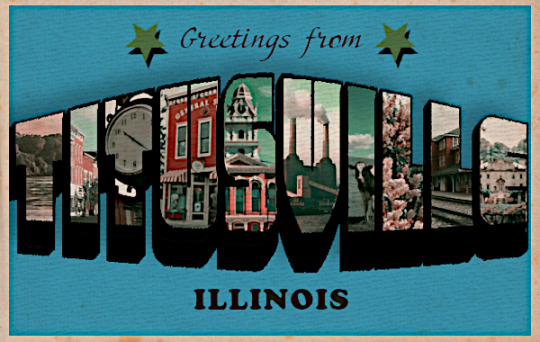
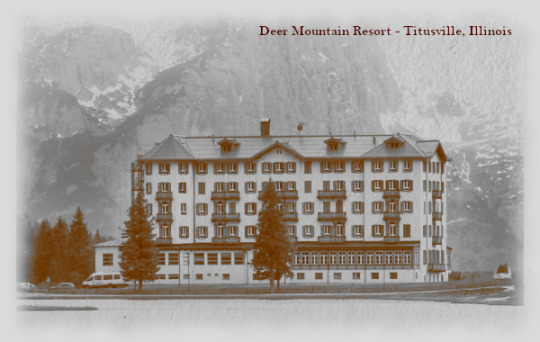



postcards from the drewniverse: titusville (clk)
#nancy drew#cluecrewplaythru#clue crew#secret of the old clock#clk#my stuff#ndpostcards#this website refused to let my posts show up in the tags last week when i wanted to post it#so it's still clk week as far as i'm concerned lol#anyway. very excited about these. combining nancy drew with my special interest (postcards) like god intended ♥#i wanted to make all the cards resemble actual cards from the 30s but i also wanted to make a card similar to hotel/motel cards of the 70s#and i'm not even sure what happened to the last one lmao#so these are all sorta chronological i guess#and i'm assuming the lilac inn survived the great depression and is still around#fun fact: the greetings from... cards were first introduced in 1931#so a year after the events of the game!
133 notes
·
View notes
Photo

guys trust me this is how they met
#bnha#fourthfifth#banjo daigoro#lariat#shinomori hikage#shih's art#as far as i'm concerned the vestige realm episode can't air fast enough#anyways small detail: banjo is meant to be standing on one foot on the stool#the other foot is swinging in the air
156 notes
·
View notes
Text
Axl Low is so fucking important to me like yes it's frustrating seeing the discrepancy between his damage and ability to convert compared to other characters but like even if he did actually suck (which to be clear he does not no matter how much I complain lol) I could not let him go. This is the guy of all time to me. Can you imagine how great the world would be if everyone was a little more like Axl Low? This guy has had so much fucked up unfair shit happen to him and all he has ever done was The Right Thing. He never got rewarded for being the world's nicest man and he just didn't care. Never became bitter never decided "Fuck this and all of you I have time powers so I'm gonna do whatever I want." This man spent so much of the series trying to get back to his girlfriend and his own timeline after being forcibly removed from it by events out of his control and the second he finds a way he makes the fucking impossible choice of "Cant do it cause it'd erase this timeline" I am SICK!! That is INSANE! He just kept doing shit he felt was right and he had a smile on for the vast majority of it. I cannot get over how strong he is. To suffer so much and just not let it change who you are at your core that is so fucking - I can't even think of a word to describe that. I wish I had half the strength and positivity of Axl Low I will just have to settle for my hands on a controller breathing life into the funny British man on my screen. Not even the only Gear character that does shit like this. Many such cases. I'm smelling the fucking game.
#sairambles#guilty gear#axl low#long post#sorry I'm losing it I just cant stop thinking about this shit#I'm vibrating and I cannot play more Strive today it'd be unhealthy and I need sleep#Axl Low is so everything I can't believe how far he's brought me#and yet the people around me are so tired of me talking about him or Gear#like suck my DICK I'm sorry you are BLIND and dont wanna feel that's a SKILL ISSUE#ggst#anyway please don't think this is cause for concern I just really like Axl Low LOL#I realise bits of this make me sound insane I just kind of went off
17 notes
·
View notes